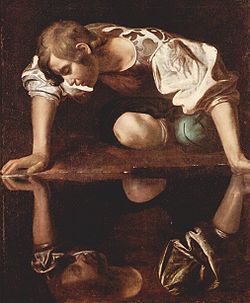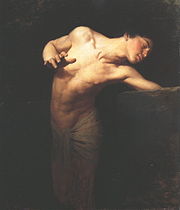- Narcissus (mythology)
-
- Ameinias redirects here. For the younger brother of Aeschylus, see Ameinias of Athens.
Narcissus or Narkissos (Greek: Νάρκισσος), possibly derived from ναρκη (narke) meaning "sleep, numbness," in Greek mythology was a hunter from the territory of Thespiae in Boeotia who was renowned for his beauty. He was exceptionally proud, in that he disdained those who loved him. Nemesis saw this and attracted Narcissus to a pool where he saw his own reflection in the waters and fell in love with it, not realizing it was merely an image. Unable to leave the beauty of his reflection, Narcissus died.[1]
Contents
Ancient sources
Several versions of this myth have survived from ancient sources. The classic version is by Ovid, found in book 3 of his Metamorphoses (completed 8 AD). This the story of Narcissus and Echo. An earlier version ascribed to the poet Parthenius of Nicaea, composed around 50 BC, was recently rediscovered among the Oxyrhynchus papyri at Oxford.[2] Unlike Ovid's version, this one ends with Narcissus committing suicide. A version by Conon, a contemporary of Ovid, also ends in suicide (Narrations, 24). A century later the travel writer Pausanias recorded a novel variant of the story, in which Narcissus falls in love with his twin sister rather than himself (Guide to Greece, 9.31.7).[3]
Influence on culture
Тhe myth of Narcissus has inspired artists for at least two thousand years, even before the Roman poet Ovid featured a version in book III of his Metamorphoses. This was followed in more recent centuries by other poets (e.g. Keats and Alfred Edward Housman) and painters (Caravaggio, Poussin, Turner, Dalí,[4] and Waterhouse).
Narcissus in literature
Russian writer Fyodor Dostoevsky used lonely Narcissus-type characters in his poems and novels, such as Yakov Petrovich Golyadkin in The Double (1846).
In Stendhal's novel Le Rouge et le Noir (1830), there is a classic narcissist in the character of Mathilde. Says Prince Korasoff to Julien Sorel, the protagonist, with respect to his beloved girl:
She looks at herself instead of looking at you, and so doesn't know you. During the two or three little outbursts of passion she has allowed herself in your favor, she has, by a great effort of imagination, seen in you the hero of her dreams, and not yourself as you really are.
(Page 401, 1953 Penguin Edition, trans. Margaret R.B. Shaw).The myth had a decided influence on English Victorian homoerotic culture, via André Gide's study of the myth, Traite du Narcisse ('The Treatise of the Narcissus', 1891), and the only novel by Oscar Wilde, the Picture of Dorian Gray.
Paulo Coelho's The Alchemist also starts with a reference to Narcissus.
Author and poet Rainer Maria Rilke visits the character and symbolism of Narcissus in several of his poems.
Seamus Heaney references Narcissus in his poem "Personal Helicon"[5] from his first collection "Death of a Naturalist":
"To stare, big-eyed Narcissus, into some spring
Is beneath all adult dignity."Harry Potter character Narcissa Malfoy, the mother of Draco Malfoy, was named after Narcissus, and was described as being incredibly vain and arrogant. Her sister, Bellatrix Lestrange and cousin Sirius Black were described as being incredibly beautiful before going to Azkaban, as were all members of the Black family.
William Faulkner's character "Narcissa" in "Sanctuary (novel)", sister of Horace Benbow, was also named after Narcissus. Throughout the novel, she allows the arrogant, pompous pressures of high-class society to overrule the unconditional love that she should have for her brother.
Hermann Hesse's character "Narcissus" in "Narcissus and Goldmund" shares several of mythycal narcissus' traits, although his narcissism is based on his intellect rather than his physical beauty.
Narcissus on film
Legendary Scottish-Canadian animator Norman McLaren finished his career with a short film named "Narcissus", re-telling the Greek legend with a few different elements in the story.
Narcissus appears in the Disney adaptation of Hercules. In the film, he is portrayed as an Olympian god with purple skin.
In the film Bab'Aziz, directed by Nacer Khemir, a Narcissus like character was portrayed by an ancient prince who sat by a pond for days after days and looked at the reflection of his own soul. He was referred as 'The prince who contemplated his soul'.
In music
"Supper's Ready" by Genesis (ca. 1972), a near-23-minute epic song laden with religious and mythological imagery, refers to the myth of Narcissus as follows: A young figure sits still by the pool / He's been stamped "Human Bacon" by some butchery tool / (He is you) / Social Security took care of this lad. / We watch in reverence, as Narcissus is turned to a flower. / A flower?. The movement is titled "How Dare I Be So Beautiful?".
Progressive metal band Threshold referenced the myth with an 11-minute epic titled "Narcissus", the closing track on their album Hypothetical. Greek metal band Septic Flesh recorded a song about Narcissus (called "Narcissus") on their album Communion. The lyrics to the song "Reflection" by Tool are partly about the Narcissus myth, about a narcissistic person looking into a reflection and pining away.
"Narcissus in a Red Dress" by The Like was released on The Like EP and their album Release Me. The Canadian band Hedley has written a song about Narcissus (called "Narcissist"). One line goes He falls in love with his reflection in the glass / He can't resist who's staring back
Composer Nikolai Tcherepnin wrote his ballet "Narcisse et Echo, Op. 40 in 1911 for Sergei Diaghilev's Ballets Russes and was danced by Nijinski. Uruguayan band El Cuarteto de Nos wrote the song "Me Amo" (I Love Myself) in which the chorus sings "como Narciso soy" (I am like Narcissus). In 2010, Swedish electronic artist pacific! released "Narcissus" an album and ballet staged in Gothenburg. [6] In 1994, composer Mark Applebaum composed Narcissus: Strata/Panacea for marimba solo. This work comprised one movement of the larger Janus Cycle, for mixed instrumentation.[7] In 1987, Thea Musgrave was commissioned by a consortium of four flutists for a solo work. She composed Narcissus for flute and digital delay.[8]
Progressive hardcore band A Lot Like Birds features a reference to Narcissus in their song "Truly Random Code"
Adoption as terminology used in psychology
- In 1898 Havelock Ellis, an English sexologist, used the term "narcissus-like" in reference to excessive masturbation, where by the person becomes his or her own sex object.[9]
- In 1899, Paul Näche was the first person to use the term "narcissism" in a study of sexual perversions.
- Otto Rank in 1911 published the first psychoanalytical paper specifically concerned with narcissism, linking it to vanity and self-admiration.[9]
- Sigmund Freud only published a single paper exclusively devoted to narcissism in 1914 called On Narcissism: An Introduction.[10]
- One of the personality disorders is called narcissistic personality disorder.
See also
Modern sources
- Graves, Robert (1968). The Greek myths. London: Cassell.
- Gantz, Timothy (1993). Early Greek Myth. Baltimore: Johns Hopkins University Press.
- Kerenyi, Karl (1959). The Heroes of the Greeks. New York/London: Thames and Hudson.
- Vinge, Louise (1967). The Narcissus Theme in Western Literature up to the Nineteenth Century.
- Calimach, Andrew (2001). Lovers' Legends: The Gay Greek Myths. New Rochelle: Haiduk Press. On-line version
References
- ^ Thanasis.com, Nemesis. retrieved March 15, 2011
- ^ David Keys, "Ancient manuscript sheds new light on an enduring myth", BBC History Magazine, Vol. 5 No. 5 (May 2004), p. 9 (accessed April 30, 2010);
- ^ Mario Jacoby, Individuation and Narcissism (1985; 2006).
- ^ "?". http://www.eee.metu.edu.tr/~akan/37MetamorphosisOfNarcissus.jpg.[dead link]
- ^ Cf. Ibiblio, Internet Poetry Archive: Text of the Poem Personal Helicon
- ^ Guardian.co.uk
- ^ Markapplebaum.com
- ^ Theamusgrave.com
- ^ a b Millon, Theodore, Personality Disorders in Everyday Life, 2004
- ^ Freud, Sigmund, On Narcissism: An Introduction, 1914
External links
s asdf
Categories:- Greek mythology
- Pederastic heroes and deities
- Narcissism
Wikimedia Foundation. 2010.


